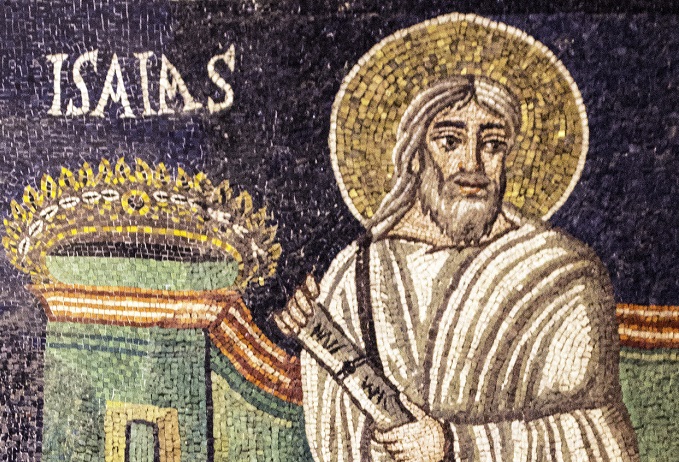This article is the third in a four-part series for those who read Scripture in worship (or those who help prepare lectors). Watch the accompanying videos.
Not only are we to proclaim the Word with all of our heart, it is also with all of our strength (me’od),1 our “muchness” or “abundance,”2 that we are called to love God.
We may feel that we are weak vessels through which the Word of God speaks but the vessel is always blessed and the strength always sufficient. For it is not with supernatural strength, but with all the strength our bodies can muster, that we are called to love the Lord our God. It is with such strength that we are called to proclaim our love for God.
Such strength girds the faithful for the most loving and least flattering acts to which our embodied proclamation leads us in our daily life: the changing of diapers and the changing of bedpans. Such strength is manifest not only in sharing the Eucharist but also in sharing a table with an unpopular kid at school. This is the strength required for (and the strength of) the “embodied proclamation” of the Word in worship, the proclamation that energizes us for service in the World.
But first we must receive the strength. And where better to have the lowly lifted up with strength than in worship? And how better than in the proclamation of the Word?
It is only after trying several concepts that I settled on “embodiment” as the most resonant term to capture the fullness of utterance that I sense we are called to in the proclamation of Scripture. And, of the three capacities with which we are called to love the Lord our God,3 strength is the one that aligns most easily with ideas of embodiment. Embodiment is of course woefully insufficient as a descriptor for the human corollary to the fullness of God (Ephesians 3:19; Colossians 1:19). John the Evangelist paid particular homage to this embodied fullness in the prologue to his gospel: “The Word became flesh and lived among us, and we have seen his glory, the glory as of a father’s only son, full of grace and truth” and “From his fullness we have all received, grace upon grace (John 1:14,16). Claiming this as the fullness we are called to channel, I believe “embodiment” speaks to our fullest capacity to imitate such a Christ.4
Limits to embodiment?
Embodiment is a term that will feel exclusionary to many who do not feel at home in their own bodies or who feel disembodied in some way, however seemingly insignificant.
For anyone who possesses a modicum of self-awareness this sporadic feeling of insufficiency will be all too familiar. Let me be perfectly clear that I do not believe there is any body that is not called to what I mean by “embodied” and “strong” proclamation. I believe we are called to walk, wheel and crawl in order to tell Scripture’s story. But I also believe that we are called to be supported in our steps (Acts 3:7-10), to be lovingly lowered through roofs (Luke 5:19), and to be dragged up hills (Mark 15:21; Luke 23:26) in order to tell the totality of Scripture’s story.
We are called to God’s service even in paralysis, perhaps especially then, when we may feel most abandoned in our bodies. Our bodies, as they are, are temples worthy of the Holy Spirit (1 Corinthians 6:19), but the Holy Spirit also demands sacrifice within the temple. I mean the term embodiment to be empowering but also sobering, to be evocative but also finite. It is meant as an expression not of some remote, philosophical fullness of God, forever beyond our ken, but of the fullness with which God loves every expressive crevice of us. After all, it is the Lord God that is our strength and our might. As long as we provide the body, God will provide the strength. This assurance, above all else, should give us the strength to trust and not be afraid, certainly in our proclamation.
Exercise: Strong proclamation
For this exercise (reading the psalm for Third Sunday of Advent, Isaiah 12:2-65) the proclaimer first reads the stanza for clarity to make sure the sense is clear and that she feels confident with the meaning and sound of her words. Next, however, she speaks through the entirety of the passage in a whisper. Be sure she does not lose any vocal energy in the process. Keep the intention to communicate and the intensity of the material alive in the voice.
Whispering is not the same as low-energy speaking. In fact, this exercise should make clear exactly how much effort (a great deal) is required to whisper articulately. This whispering is an act of utter trust: that for the proclaimer, the “Lord God will (indeed) be her strength and her might,” as she is providing only barely enough amplification to be audible. Make sure the speaker notices the way the articulation of the words change when whispered. Sense the labor required to “sound out” the language and the difference between what is “pronounced” and what is “announced.”
Ideally this exercise will be done in a group, in which case it is very informative to sense how the listeners lean into the words and proclamation when whispered. Afterward ask listener and proclaimer to discuss whether the strength of the Lord seemed or did not seem to be manifest in the speaking of the proclaimer. It is often incredibly powerful to witness (and especially hear) the movement of the language when whispered: so specific, articulate, and intimate. And yet surprisingly mighty.
Notes:
1 Hebrew and Aramaic Lexicon of the Old Testament (HALOT), s.v. “me’od,” 2:538.
2 Brown-Driver-Briggs, A Hebrew and English Lexicon of the Old Testament (Abridged), s.v. “me’od,” 547.
3 Deuteronomy 6:5.
4 “Be imitators of me, as I am of Christ” (1 Corinthians 11:1).
5 “Surely God is my salvation;
I will trust, and will not be afraid,
for the Lord God is my strength and my might;
he has become my salvation.
With joy you will draw water from the wells of salvation. And you will say in that day:
Give thanks to the Lord,
call on his name;
make known his deeds among the nations;
proclaim that his name is exalted.
Sing praises to the Lord, for he has done gloriously;
let this be known in all the earth.
Shout aloud and sing for joy, O royal Zion,
for great in your midst is the Holy One of Israel” (Isaiah 12:2-6).

